
Eastern Journal of European Studies
Scope & Guideline
Illuminating the past and present of Europe through rigorous study.
Introduction
Aims and Scopes
- Interdisciplinary Research:
The journal emphasizes studies that integrate multiple disciplines, such as economics, political science, sociology, and cultural studies, to provide comprehensive insights into Eastern European affairs. - Socio-economic Development:
A core focus on analyzing socio-economic trends, challenges, and strategies in Eastern Europe, including issues related to economic growth, regional development, and labor market dynamics. - Political Dynamics and Governance:
Research examining political structures, governance issues, and the impact of EU policies on Eastern European countries, including democratic transitions and rule of law. - Cultural Studies and Identity:
The journal explores cultural dimensions and identity formation in Eastern Europe, including the effects of historical narratives, nationalism, and cultural diplomacy. - Sustainability and Resilience:
A commitment to investigating sustainable development practices and resilience strategies in the context of environmental, economic, and social challenges faced by Eastern Europe.
Trending and Emerging
- Impact of Crises on Governance and Policy:
There is a notable increase in studies analyzing how crises, such as the COVID-19 pandemic and geopolitical tensions, have reshaped governance and policy-making in Eastern Europe. - Gender Studies and Empowerment:
Emerging research is focusing on gender issues, particularly women's empowerment and its effects on education and socio-economic development, reflecting a broader societal push for gender equality. - Digital Transformation and Skills:
The rise of digital technologies and their impact on employment and education is a growing area of interest, highlighting the importance of digital skills in the contemporary labor market. - Resilience and Adaptation Strategies:
Research on resilience, particularly in response to crises such as war and economic downturns, is gaining traction, emphasizing the need for adaptive strategies in socio-economic planning. - Cultural and Heritage Sustainability:
An increasing focus on the role of culture and heritage in sustainable development is emerging, as scholars explore how cultural assets contribute to regional identity and economic resilience.
Declining or Waning
- Traditional Economic Models:
Research centered around traditional economic theories and models appears to be decreasing, likely due to the growing interest in more dynamic and integrative approaches to economic analysis. - Historical Political Studies:
While historical political analyses were once prevalent, there seems to be a waning interest in purely historical perspectives without contemporary relevance, as scholars increasingly focus on current political issues. - Static Cultural Analysis:
Studies that offer static or monolithic views of cultural dynamics are becoming less common, as there is a shift towards understanding culture as a fluid and evolving construct influenced by global interactions. - Regionalism in Isolation:
The focus on regionalism without considering the broader European context has diminished, indicating a trend towards more interconnected analyses that consider transnational influences. - Legal Frameworks without Application:
Research that discusses legal frameworks in isolation, without practical implications or case studies, is less frequently published, reflecting a demand for more applied legal research.
Similar Journals
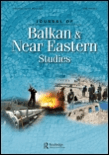
Journal of Balkan and Near Eastern Studies
Empowering Scholars with Open Access to Pivotal Research.Welcome to the Journal of Balkan and Near Eastern Studies, a premier academic publication dedicated to advancing scholarship in the complex and dynamic fields of history, political science, and international relations within the Balkans and Near Eastern regions. Published by Routledge Journals, Taylor & Francis Ltd, this journal boasts a robust Q1 status in History and Q2 in Political Science and International Relations for 2023, reflecting its significant impact on contemporary research. The journal, which has been in circulation since 2008, contributes valuable insights and analyses, making it an essential resource for scholars and practitioners aiming to deepen their understanding of these historically rich areas. Research featured in this peer-reviewed journal is recognized for its rigorous methodology and innovative perspectives, with high rankings in Scopus across relevant disciplines (Arts and Humanities History: Rank #120/1760, Percentile 93rd; Social Sciences Political Science and International Relations: Rank #274/706, Percentile 61st). As an Open Access title, the Journal of Balkan and Near Eastern Studies ensures that pivotal research is accessible to a global audience, fostering dialogue and collaboration among researchers, professionals, and students alike.

New Perspectives
Illuminating new paths in political theory and international discourse.New Perspectives is a pivotal academic journal published by SAGE Publications Inc, dedicated to advancing the fields of Political Science and International Relations. With a focus on innovative research and critical analysis, it has established a notable presence since its inception in 2015, currently holding a Q3 ranking in its category for 2023. Based in the Czech Republic, New Perspectives has a robust Scopus rank of #292 out of 706, placing it in the 58th percentile among social science journals. This underscores its significance in fostering scholarly dialogue and presenting fresh ideas in a rapidly evolving global landscape. While not open access, the journal attracts a diverse readership, including researchers, professionals, and students who are keen on exploring emerging trends and insights in political theory and international discourse. The journal’s commitment to high-quality scholarship makes it an essential resource for those aiming to contribute to and engage with contemporary political challenges.
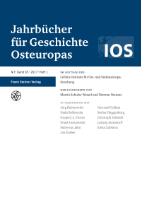
JAHRBUCHER FUR GESCHICHTE OSTEUROPAS
Exploring the Rich Tapestry of Eastern European HistoryJAHRBUCHER FUR GESCHICHTE OSTEUROPAS, published by FRANZ STEINER VERLAG GMBH, is a prominent academic journal dedicated to the exploration of Eastern European history. With its inception dating back to 1978, this journal has consistently provided a platform for scholarly discourse, contributing significantly to the understanding of the region's complex historical narratives. While the journal is not open access, it holds a solid reputation within the academic community, positioned in the Q4 quartile in history as per the 2023 category rankings, and stands at Rank #1636 within the Scopus Arts and Humanities History ranking. The convergence of its publication years throughout the decades emphasizes a long-standing commitment to historical research, thereby making it an essential resource for researchers, professionals, and students interested in Eastern European studies. Explore the intricate dynamics of historical events and cultural developments that shape Eastern Europe through this invaluable periodical.
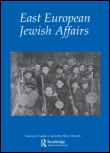
East European Jewish Affairs
Advancing Scholarly Discourse on Jewish Affairs in Eastern EuropeEast European Jewish Affairs is a prominent scholarly journal published by Routledge Journals, Taylor & Francis Ltd, dedicated to exploring the intricate historical, cultural, and political dynamics of Jewish communities in Eastern Europe. With ISSN 1350-1674 and E-ISSN 1743-971X, this journal has been a critical platform for academic discourse since its inception in 1992, resuming publication after a hiatus in 2005. Although it is not an open-access journal, it provides vital insights into Jewish studies, engaging researchers, professionals, and students alike with in-depth analyses and discussions. The journal currently holds a Q4 ranking in multiple categories, including Cultural Studies, History, and Political Science and International Relations, reflecting its niche yet significant contribution to these fields. The 2023 Scopus rankings position it within the 34th percentile in History and the 10th percentile in Political Science, evidencing its specialized focus and the evolving nature of Jewish studies. For those investigating the unique social and cultural trajectories of East European Jewish communities, East European Jewish Affairs serves as an essential resource.

Papeles de Europa
Illuminating the Complexities of EuropePapeles de Europa is a distinguished academic journal published by UNIV COMPLUTENSE MADRID, SERVICIO PUBLICACIONES, specializing in the multifaceted study of European affairs, politics, culture, and social issues. With an ISSN of 1989-5917 and fully committed to the principles of open access since 2009, the journal aims to promote the dissemination of high-quality scholarly research accessible to a global audience. Its editorial team is dedicated to fostering critical dialogue and advancing knowledge that addresses the complexities of contemporary European society. As a vital resource for researchers, professionals, and students alike, Papeles de Europa endeavors to enrich the academic community's understanding of Europe through research articles, reviews, and insightful discussions. The journal is situated in Madrid, Spain, and serves as a key platform for emerging voices in European studies, contributing significantly to the field's ongoing scholarly discourse.

OSTEUROPA
Bridging Disciplines in Eastern European ResearchOSTEUROPA is a distinguished academic journal dedicated to the examination and analysis of social, cultural, and political developments in Eastern Europe. Published by BWV-BERLINER WISSENSCHAFTS-VERLAG GMBH, this journal has been a critical voice in the field since its inception in the mid-20th century, notably converging from various years to establish a comprehensive discourse on the dynamics shaping the region. With an ISSN of 0030-6428 and an E-ISSN of 2509-3444, OSTEUROPA taps into the expansive fields of sociology and political science, holding a reputable Q3 category ranking in these disciplines for 2023. While not currently an open access publication, it remains a vital platform for researchers, professionals, and students alike who seek to deepen their understanding of Eastern European affairs. The journal also ranks in the 17th percentile within the Scopus listings, underscoring its role as a significant, albeit niche, contributor to social studies and political science scholarship. Addressed from its base in vibrant Berlin, OSTEUROPA continues to foster intellectual dialogue and provide valuable insights into the complexities of Eastern European societies.
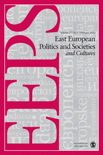
EAST EUROPEAN POLITICS AND SOCIETIES
Bridging academic discourse with the realities of Eastern Europe.EAST EUROPEAN POLITICS AND SOCIETIES, published by SAGE Publications Inc, stands as a vital academic resource within the fields of sociology and political science, focusing primarily on the dynamics and transformations of Eastern Europe. With an ISSN of 0888-3254 and an E-ISSN of 1533-8371, this quarterly journal has been contributing to scholarly discourse since 1986 and continues to be a crucial platform for the exchange of innovative research and critical insights, boasting a commendable Q2 ranking in its category as of 2023. Researchers, professionals, and students engaged in the exploration of post-socialist transitions, identity politics, and socio-economic challenges will find this journal an essential tool for understanding the complexities of the region. While the journal offers limited open access options, its presence in academic databases ensures that cutting-edge research remains accessible to a broader audience. With a Scopus rank of #606 out of 1466 in the social sciences category, EAST EUROPEAN POLITICS AND SOCIETIES continues to shape the intellectual landscape and discourse surrounding Eastern Europe.
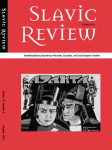
SLAVIC REVIEW
Advancing Knowledge in Slavic Cultural and Social Dimensions.SLAVIC REVIEW, published by Cambridge University Press, is a prominent academic journal that delves into the rich tapestry of Slavic studies, focusing on the cultural, historical, and social dimensions of Slavic regions. With an ISSN of 0037-6779 and an E-ISSN of 2325-7784, this journal holds a significant position within the academic community, ranking in the Q2 category of Arts and Humanities (miscellaneous) and achieving a Q1 rating in Cultural Studies as of 2023. Notably, the journal has consistent relevance in the field, as evidenced by its Scopus rankings—Rank #260 in Cultural Studies and Rank #204 in Miscellaneous Arts and Humanities. Since its converged years starting from 1966 up to the present, SLAVIC REVIEW has been an essential resource for researchers, professionals, and students aiming to deepen their understanding of Slavic cultures. While it operates on a traditional subscription model and does not provide open access, the journal remains a vital platform for pioneering research and critical discourse in Slavic studies.

Central and Eastern European Migration Review
Pioneering Research on Migration Dynamics and Societal ChangeThe Central and Eastern European Migration Review, published by the CENTRE MIGRATION RESEARCH, University of Warsaw, serves as a critical platform for sharing innovative research on migration dynamics within Central and Eastern Europe. This Open Access journal has been a vital resource for scholars since its inception in 2012, enabling widespread access to high-quality research that addresses pressing demographic, social, and political issues related to migration. With an impressive ranking among the Q2 category in Demography, Social Sciences (miscellaneous), and Sociology and Political Science, it occupies a significant space in contemporary sociological discourse, reflecting its robust scholarly impact. Notably, the journal achieved Scopus rankings that place it in the 60th percentile or higher within multiple categories, highlighting its contributions to the field. Researchers, professionals, and students alike can delve into a diverse array of articles that explore migration trends, policies, and societal implications, making it an indispensable resource for anyone engaged in migration studies.
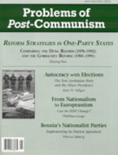
PROBLEMS OF POST-COMMUNISM
Navigating the Challenges of a New EraPROBLEMS OF POST-COMMUNISM is a distinguished academic journal focused on the critical examination of political, social, and economic transformations in post-communist societies. Published by Routledge Journals, Taylor & Francis Ltd, this journal features an ISSN of 1075-8216 and an E-ISSN of 1557-783X. With an impressive ranking of Q2 in the fields of Sociology and Political Science, and a Scopus position of #290/1466 (80th percentile), it stands as a vital resource for researchers and practitioners alike. The journal spans a convergence of years from 1996 to 2024, offering a rich archive of scholarship. Although it does not currently provide open access options, its rigorous peer-reviewed articles delve into the intricate dynamics shaping post-communist states, making significant contributions to contemporary academic discourse. Addressed to an audience keen on understanding the societal shifts and challenges facing these regions, PROBLEMS OF POST-COMMUNISM is essential for anyone seeking insightful analyses and robust dialogue in this evolving field.